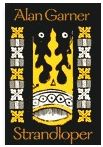Here's the first review that I've written for this blog. A shorter version will appear on Goodreads. It deals with a novel that is loosely based on the life of William Buckley, an Englishman who was transported to Australia in 1803.
I very much enjoyed Strandloper. Other readers might have trouble with the
dialects in this novel. I was able to
decipher them without much difficulty, but the author gives no explanations or
assistance to readers. Another caveat is that Garner’s radical
divergence from history might disturb those who prefer their historical fiction
to be closer to verifiable facts. When
historical figures are fictionalized, it’s delightful when the result speaks to
me on a personal level, and is congruent with my own values. This is a lovely fiction from my perspective.
It reminds me of all those very compelling Pagan martyr fictions about Hypatia
of Alexandria. It’s too bad that the
truth about Hypatia is more complex. I am someone who tends to research historical
fiction when I’m interested in the subject it covers. So I proceeded to uncover
the truth about William Buckley, the historical protagonist of Strandloper. ( Please note that if you are searching for him
on the internet, you should add Australia to your search terms to avoid being
deluged with results related to the conservative pundit William F.
Buckley. )
Yes, William Buckley was from a small village in Cheshire,
England. Yet beyond this fact, Alan Garner begins to depart from the actual biography
of his subject in a major way. The
fictional character called William
Buckley is a Pagan visionary who seems to live more on the mystical plane than
in what most of us consider reality. Not
only this, he was taught to read. This
was a rare accomplishment for country villagers in the England of his era. The real William Buckley lived from 1780-1856
according to the Australian Dictionary of Biography. He was neither a Pagan nor a visionary, and
he died illiterate. Garner’s Buckley hadn’t ever left his village before his
arrest and transport to Australia. Although there isn’t agreement among the
sources that I consulted about the reason why the real Buckley was transported,
they do agree that Buckley fought Napoleon in Holland. It seems to me that the
fictional Buckley of Strandloper is
more likely to have been confined to Bedlam than to have had any kind of a
military career. I loved the ability of
Garner’s character to immerse himself in Australian aborigine culture. The real Buckley lived among the aborigines
for 32 years, but he had a more ambivalent relationship with them. I was interested to learn that Australians
admire Buckley’s unlikely survival in the outback so much that they call a low
probability of success “Buckley’s chance”.
If you would like to learn more about the real William
Buckley, here are the resources that I found:
The Life and Adventures of William Buckley
This is the Goodreads book page for a biography of Buckley that appeared in 1852 while Buckley was still alive. Although it wasn't well received when it was first published, historians now see it as an accurate portrayal of Buckley's experiences and Australian aborigine culture.
The Life and Adventures of William Buckley
This is the Goodreads book page for a biography of Buckley that appeared in 1852 while Buckley was still alive. Although it wasn't well received when it was first published, historians now see it as an accurate portrayal of Buckley's experiences and Australian aborigine culture.
Article on William Buckley in The Australian Dictionary of Biography
Article on William Buckley from Cheshire Magazine
A video dramatization of Buckley's life with the aborigines on an Australian blog
Video on the same Australian blog about William Buckley
William Buckley on Wikipedia
In conclusion, even though Strandloper can't be considered historically accurate, it was an amazingly good story. It also led me to learn a bit more about Australian history through the research I did on William Buckley after reading it. I'm glad I selected this book as my Australian read for the Around the World challenge.
Article on William Buckley from Cheshire Magazine
A video dramatization of Buckley's life with the aborigines on an Australian blog
Video on the same Australian blog about William Buckley
William Buckley on Wikipedia
In conclusion, even though Strandloper can't be considered historically accurate, it was an amazingly good story. It also led me to learn a bit more about Australian history through the research I did on William Buckley after reading it. I'm glad I selected this book as my Australian read for the Around the World challenge.



No comments:
Post a Comment